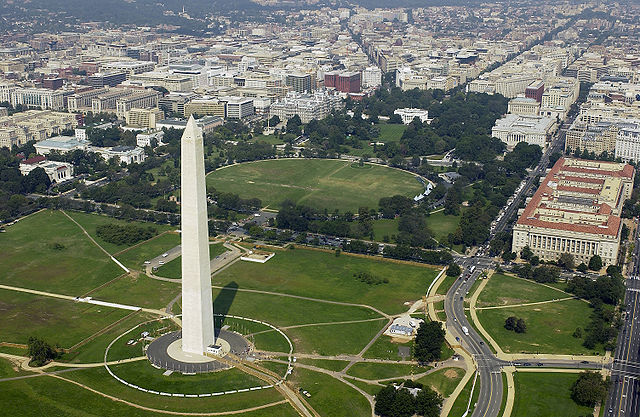Confidence in Government on National Security Matters: October 2018
In July 2017, we began a polling project to measure public confidence in government institutions on national security matters on an ongoing basis.This post provides, a bit belatedly, our data for the month of October 2018.

Published by The Lawfare Institute
in Cooperation With

In July 2017, we began a polling project to measure public confidence in government institutions on national security matters on an ongoing basis.This post provides, a bit belatedly, our data for the month of October 2018. It includes perceptions about government institutions and about the two major political parties’ handling of national security; about the public’s comfort with intelligence authorities; about the president’s handling of key national security issues; about Special Counsel Robert Mueller’s investigation; and about ongoing military operations.
Bottom line: The public was in a good mood in October. Confidence in everyone is up.
Confidence in Institutions to Protect U.S. National Security Trend Up Across the Board
From Oct. 25-27, 2018, we used Google Surveys to ask respondents the following questions about confidence in institutions:
- How much confidence do you have in the Congress to protect U.S. national security?
- How much confidence do you have in the federal courts to protect U.S. national security?
- How much confidence do you have in the president to protect U.S. national security?
- How much confidence do you have in the intelligence community to protect U.S. national security?
- How much confidence do you have in the military to protect U.S. national security?
In October, confidence in institutions to protect U.S. national security went up across all five institutions tracked in this survey. The cause of this uniform, and positive, change in confidence is not immediately apparent. On a scale of 1 (“No confidence”) to 5 (“High confidence”), the average score for each institution from highest to lowest was: 3.97 for the military, 3.31 for the intelligence community, 2.97 for the federal courts, 2.84 for the president and 2.61 for Congress.
The president’s average confidence score of 2.84 is his all-time high, barely eclipsing his June 2018 score of 2.83. Confidence in the president has increased each of the last two months, which may reflect a recovery in confidence after a damaging summer for him on national security matters—a summer which included the Helsinki summit with Russian President Vladimir Putin in July, the passing of Sen. John McCain in August that put the incumbent’s national security record in stark relief, and the conviction of his former campaign chair Paul Manafort and the first plea agreement for his former personal attorney Michael Cohen. But the president’s gains this past month came almost exclusively with men; confidence in the president with men increased from 2.99 to 3.09, while with women it increased negligibly from 2.59 to 2.60. Consistent with past findings, confidence in the president on national security matters seems to track his support levels in other polls over time. The president’s low point in our polling came at the beginning of our surveys, when he measured in at 2.58 in July 2017. At that time, his approval rating in the FiveThirtyEight average of his approval ratings was in the high thirties. The president’s confidence rating began creeping up, however, over the following months, as did his more general approval rating. Now at an all-time high of 2.84 this month—the president’s approval rating in the FiveThirtyEight average is in the low forties.
The other four institutions we track also saw a boost in average confidence this month. This is a break from last month, when confidence in the president increased but confidence in every other institution dropped. This month, the largest increase in confidence was in the intelligence community, which jumped from 3.20 to 3.31. This tracked closely with the federal courts, which saw an increase from 2.87 to 2.97. Confidence in Congress increased from 2.54 to 2.61 on our scale. And confidence in the military, which is already high, increased from 3.92 to 3.97.

Confidence in Both Parties Hit Record Highs This Month
Following the trend of confidence in national security institutions increasing this month, confidence in both the Democratic and Republican parties also jumped up in October. We ask two separate questions to gauge the public’s party preferences on national security. The results of both questions this month illustrated Republicans’ resilient advantage on national security matters, though Democrats did make marginal inroads.
The first question concerns confidence in the parties to handle national security matters generically. On that question, in October, average confidence in the Republican Party’s ability to protect U.S. national security stood at 2.89, while average confidence in the Democratic Party’s ability stood at 2.74. The confidence levels for both parties this month are all-time highs for this project. Both parties are perceived more favorably than is Congress as a whole, which has an average confidence score of 2.61. Since last month, confidence in the Democratic Party jumped from 2.61 to 2.74, while confidence in the Republican Party increased more marginally from 2.81 to 2.89.

The partisan margin for our second question—“Which of the parties will do a better job protecting the country from international terrorism and military threats?”—held relatively steady this month. On this question, Republicans retain a healthy advantage when respondents are asked to choose between the parties or options of “neither” or “don’t know.” When asked in this manner, 34 percent of respondents chose the Republican Party, while 25 percent chose the Democratic Party; 22 percent chose “don’t know,” and 19 percent chose “neither.” In September, Republicans’ advantage versus Democrats on this question was 10 points. The real shift this month is in the share of respondents answering “neither” or “don’t know”; this share dropped from 46 percent in September to 41 percent this month. This drop may have been a product of voters returning to their partisan bases; this month’s poll was in the field just 10 days ahead of Election Day.
As previous Third Way research reflects, when the “security gap” is large and salience is high, it can diminish Democrats’ prospects, and raise those of Republicans, in elections. However, unlike recent past cycles, the salience of national security was low this year. Just 18 percent of voters in battleground U.S. House districts listed national security as a top issue in deciding their vote ahead of Election Day.

The Public Remains Uncertain About Intelligence Authorities
In late October we once again asked respondents, “How comfortable are you with the powers of the U.S. intelligence community? Do intelligence agencies in your view have not enough authority or do they have too much authority?” There was a slight drop in the average response since September (from 3.14 to 3.10 in October). As in all previous months that we’ve asked this question, respondents lean slightly toward the intelligence community having too much authority. However, also as in all previous months, far and away the most common response to this question (47 percent) is a neutral 3 on our scale. And 74 percent of respondents chose one of the middle three options, not either 1 or 5.

Inconsistent Changes in Confidence in the President’s Handling of Key National Security Issues
Last November, we began asking respondents how confident they were in the president’s ability to handle key national security issues, specifically with regard to Iran, North Korea and terrorism. In October, confidence in the president on these topics remains middling on our scale—at 2.57 for Iran, 2.63 for North Korea and 2.72 for terrorism. All these scores fall below general confidence in the president on national security at 2.84. The only topic that featured an increase in confidence this month was North Korea, from 2.53 to 2.63, which nearly matches the president’s all-time high of 2.64 from June of this year after the Singapore summit with North Korean leader Kim Jong-un. These numbers have tended to move together, reflecting an overall sense of confidence in the president’s handling of national security. But interestingly, this month confidence dropped slightly on terrorism, from 2.77 to 2.72, and on Iran it held steady at 2.57.

Confidence in Special Counsel Mueller Increases Nominally to Match All-Time High
As we have since October 2017, we once again asked the public about its level of confidence in Robert Mueller’s “fairness and objectivity” at the end of October, and the average score was a 2.96 on our scale, a nominal increase (from 2.94) in September. While a small increase, Mueller’s October confidence score matches his all-time high from February 2018.
Confidence in the Mueller investigation has tended to spike when the special counsel indicts people or reaches plea agreements. Given this, it is noteworthy that confidence in Mueller has increased—albeit gradually—over the late summer and early fall, which coincided with the quiet period of the Mueller investigation during which public actions were not taken in order to not disrupt the midterm election season.
This finding tends to conform with exit polling data on Election Day, which showed slightly more voters disapproving than approving of Mueller’s handling of the investigation. Notably, according to the NBC News exit poll, voters are divided sharply on partisan lines on this question, with 61 percent of Democrats approving of Mueller, compared to just 20 percent of Republicans.

Confidence in Ongoing Military Operations Remains Well Below Overall Confidence in the Military
While the military enjoys the highest level of public confidence of any government institution we ask about (a 3.97 on our scale), confidence in ongoing military operations in Afghanistan and Iraq-Syria is markedly lower, with average confidence scores of 2.89 and 2.77, respectively. Public confidence in these conflicts increased slightly or held steady from September to October. Notably, there is no indication that a rash of insider attacks in Afghanistan during September and October, including one that nearly took the life of the top American and NATO commander, Gen. Austin Miller, had any impact on confidence in our operations in the country.
As the trend line indicates, confidence in these military operations has wavered little since we began asking about these conflicts in November, a result that is perhaps explained by scant media attention toward these operations in recent months.

Methodology
From Oct. 25-27, we once again used Google Surveys, which is supporting this project with a large in-kind donation of access to its survey platform, to ask a variety of questions related to national security. Respondents are internet users age 18 and older who answer “surveywall” questions on websites that use Google Opinion Rewards for Publishers to access content. Surveys appear on a network of more than 1,500 sites, including USA Today and the Financial Times. For more information on Google Surveys’ methodology, including questions regarding sampling bias and inferred demographics, please see Google’s white paper on the topic. Benjamin Wittes and Emma Kohse also discussed criticisms and advantages of the Google Surveys methodology at some length in this paper.








